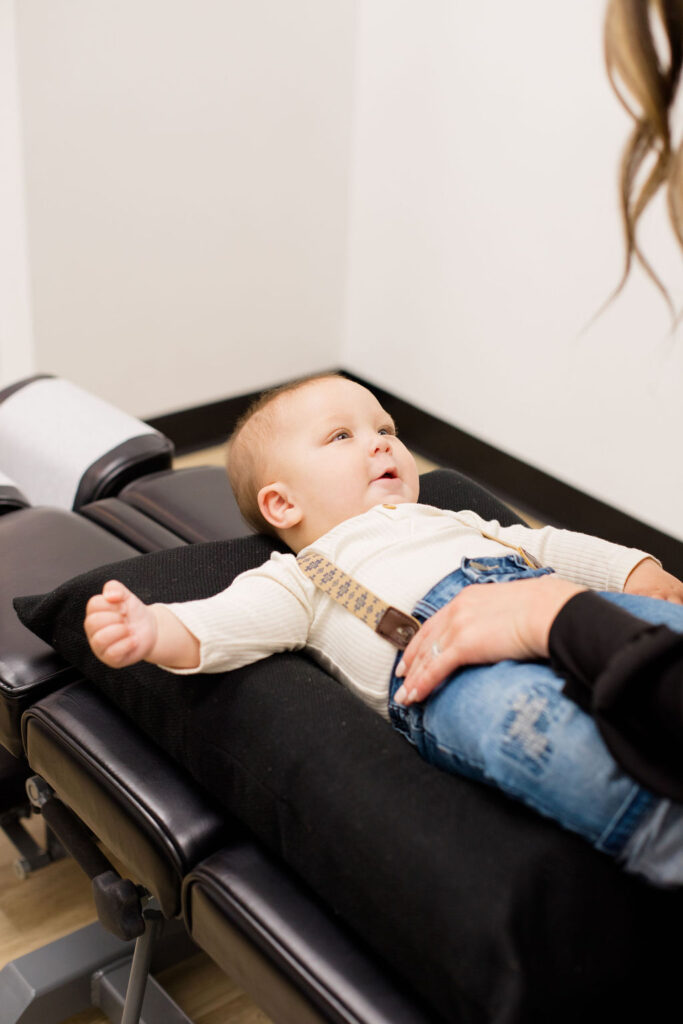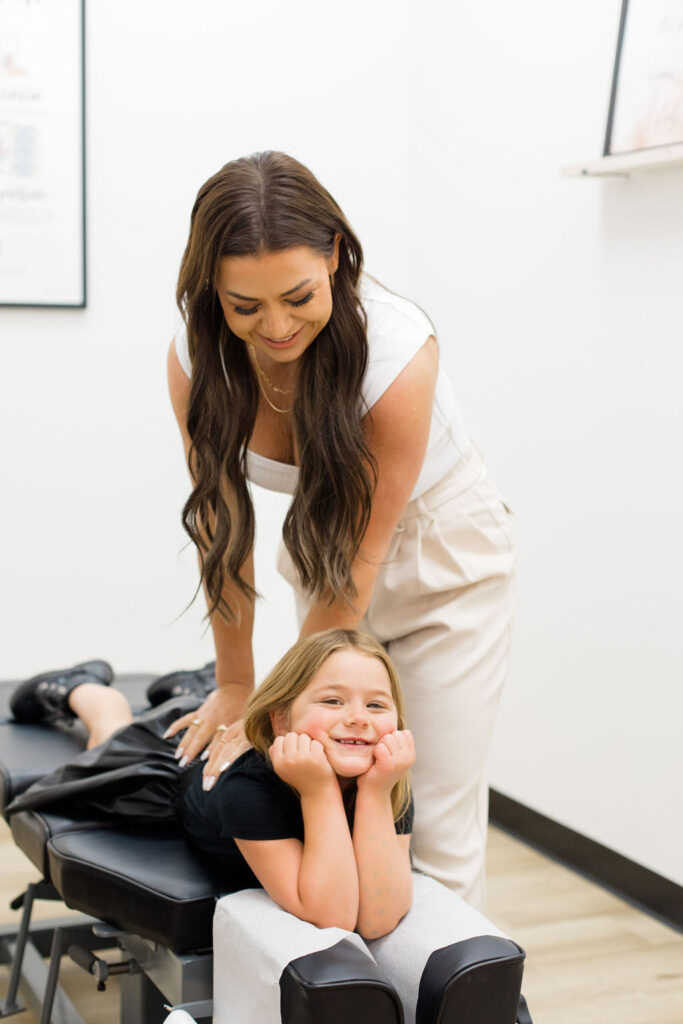When it comes to your child’s well-being, the question ‘Are pediatric chiropractors safe?’ is important. This article addresses your concern, exploring how chiropractors are trained for children’s care, the technique adjustments for young patients, and the oversight that promises safe practice. Here, you’ll find the straightforward information you need, stripped of misconceptions and focused on facts.
Key Takeaways
- Pediatric chiropractic care is generally safe when performed by trained professionals, involving gentle techniques tailored to children’s unique developmental needs and aiming to alleviate various childhood ailments.
- The International Chiropractic Pediatric Association (ICPA) plays a vital role in promoting safe and effective pediatric chiropractic practices through research, setting standards, and offering continuing education to practitioners.
- Despite some skepticism, clinical studies and anecdotal evidence largely support the safety and potential benefits of pediatric chiropractic care, although more research is required to fully understand its efficacy for specific conditions.
Exploring the Safety of Pediatric Chiropractic Treatment

Pediatric chiropractic care is a specialty focused on aligning children’s spines and balancing their nervous systems to support their growth and overall health from infancy through adolescence.
Chiropractors treat children using pediatric chiropractic care, which, when administered by a proficient practitioner, is typically viewed as safe. The methods and care philosophies employed are designed to be gentle and supportive of children’s health.
Tailoring the treatment to meet the unique needs of each child is a pivotal component in guaranteeing safety in pediatric chiropractic care. This involves using techniques that ensure no discomfort during sessions, and there is an absence of evidence indicating harm from such care. While common concerns may include potential short-term effects such as slight discomfort, fussiness, or changes in sleeping patterns, these are usually mild and temporary.
Parents must weigh the benefits of a holistic approach to their children’s health against potential concerns and mild side effects. Some key considerations include:
- Maintaining open lines of communication with a proficient pediatric chiropractor
- Opting for a practitioner who possesses the necessary expertise and dedication to child-centered care
Understanding Pediatric Adjustments

Pediatric chiropractic adjustments are specifically tailored to meet the physiological and developmental needs of children, differing significantly from traditional adult chiropractic methods. The force applied during these adjustments is significantly gentler, akin to the pressure used when testing the ripeness of an avocado, ensuring it is appropriate for the child’s age, size, and developmental stage.
These gentle adjustments can alleviate conditions such as colic and digestive issues in infants by improving the function of the digestive system. The objective of pediatric chiropractic care is to uphold correct alignment, bolster the child’s posture, and rectify spinal misalignments that could potentially impact their comprehensive health.
Training and Qualifications of Pediatric Chiropractors
Pediatric chiropractors undergo specialized training that focuses on caring for young patients and mastering gentle techniques tailored for children’s developing bodies. After completing this specialized training, chiropractors can be awarded certifications such as the Certification by the Academy Council of Chiropractic Pediatrics (CACCP).
Choosing a licensed pediatric chiropractor with experience in pediatric spinal adjustments is important in safeguarding the well-being of young patients. The chiropractors at Impact Chiropractic are among the top in Northern Colorado, holding the necessary training and certifications to provide safe pediatric chiropractic care.
Monitoring and Adapting to Each Child’s Needs
Impact Chiropractic customizes each chiropractic therapy session to cater to the child’s age, health condition, and developmental status, ensuring that the treatment plans are individualized. This personalized approach helps address specific health issues and promotes overall well-being.
The frequency of regular pediatric chiropractic visits varies per individual, depending on the child’s particular needs and the responsive progress from the treatment. Regular assessments and adaptations ensure that each child receives the most appropriate care for their condition.
The Role of the International Chiropractic Pediatric Association (ICPA)

The International Chiropractic Pediatric Association (ICPA) plays a role in supporting pediatric chiropractors. The ICPA:
- Aids in developing safe practices
- Formulates guidelines that influence the pediatric chiropractic care field
- Fosters research initiatives to uphold the highest care standards.
By setting these guidelines and promoting ongoing research, the ICPA helps ensure that pediatric chiropractic care is safe and effective. The standards of practice established by the ICPA are designed to protect young patients and provide reliable care.
The ICPA’s endeavors reach further than setting standards and conducting research, they also encompass educational programs for chiropractors. These initiatives equip practitioners with cutting-edge knowledge and techniques to deliver optimal care for their pediatric patients.
Standards of Practice
Approximately 45% of chiropractors have received formal postgraduate pediatric chiropractic training. Many chiropractors also supplement their formal training with informal methods, such as self-study or peer communication, to add to their expertise.
The ICA Council on Chiropractic Pediatrics establishes high standards of practice specifically for chiropractors treating infants, children, and pregnant women. These standards ensure that pediatric chiropractic care is both safe and effective.
Research Initiatives
The ICPA’s research initiatives have a considerable national reach, engaging approximately 3,500 member clinicians across an equal number of practices or clinics. These initiatives involve a large patient demographic, with about 100,000 individuals participating in various research studies.
The ICPA backs various research initiatives with the aim of enriching knowledge and guaranteeing the safety of pediatric chiropractic care. The Practice-Based Research Network (PBRN), established in 2008, is designed to enhance healthcare delivery and patient outcomes specifically for chiropractic treatment.
Continuing Education
The ICPA offers a Pediatric Certification Program with 200 hours of training and specialized courses for children and pregnant women’s care. Chiropractors can obtain additional qualifications such as:
- DACCP (Diplomate of the American Chiropractic Council on Pediatrics)
- CACCP (Certified by the Academy Council of Chiropractic Pediatrics)
- Webster Certified, indicating advanced ICPA training.
The ICPA offers a blend of in-person and online continuing education courses to chiropractors worldwide, guaranteeing practitioners’ access to the most recent knowledge and techniques. Seminars are held in various locations across the United States, Canada, and Europe annually, making these programs widely accessible.
Common Misconceptions About Pediatric Chiropractic Care

Misinterpretations surrounding pediatric chiropractic care frequently stem from skepticism about its safety and efficacy. However, clinical studies have frequently reported minimal side effects, supporting the safety of these treatments. Research has demonstrated promising results, with few adverse events reported.
Although long-term safety studies are less common, the available evidence suggests a low risk associated with pediatric chiropractic care. More comprehensive research is needed to debunk myths and provide a clearer understanding of its safety and efficacy.
Debunking Myths with Scientific Evidence
According to a study by the ICPA, only a small percentage of children experienced discomfort after pediatric chiropractic adjustments. However, no significant adverse reactions were reported. Controlled studies have shown that chiropractic manipulation is ineffective in treating conditions such as colic in pediatric patients, as evidenced by a blinded and placebo-controlled trial.
Despite some clinical studies indicating limited efficacy for specific conditions, many parents report significant improvements in their child’s health following chiropractic care. Overall, studies from reputable sources support the safety and potential benefits of pediatric chiropractic care, including chiropractic treatments.
Anecdotal Evidence vs. Clinical Studies
Some chiropractors may rely on anecdotal evidence to support the efficacy of their treatments in pediatric care, as opposed to conventional medicine. However, the reproducibility of chiropractic studies can be challenged due to design issues, which may affect the validity of these anecdotal success stories.
To assess the safety of pediatric chiropractic care, more comprehensive research through peer-reviewed clinical studies is needed. This research will provide clearer guidelines and recommendations for pediatric chiropractic care.
How Impact Chiropractic Prioritizes Your Child’s Health

Impact Chiropractic is a community-driven chiropractic clinic in Northern Colorado focused on providing whole-person chiropractic care. The services offered include chiropractic care for all ages, ranging from adults to pediatric care, athletes, and injury recovery. Our approach to pediatric care is underpinned by a strong commitment to safety and efficacy, grounded in scientific evidence and years of clinical practice.
To maintain children’s spinal health and detect any developmental misalignments early, regular spinal check-ups are a key component of our pediatric services. We ensure that every child receives personalized and effective care tailored to their specific needs.
Our dedication to community health is manifested in our participation in local events and our support for non-profit organizations, which serves to increase awareness about pediatric chiropractic care. This collaborative approach emphasizes the importance of parental involvement in the chiropractic treatment of their children.
Our Commitment to Community Health
Pediatric chiropractic care at Impact Chiropractic aims to enhance the immune function of children, addressing common childhood illnesses and overall well-being. By participating in community events in Fort Collins and Northern Colorado, we raise awareness of chiropractic as a viable option for managing a variety of children’s ailments.
Supporting local non-profit organizations with contributions demonstrates our commitment to the Northern Colorado community’s health. We champion a collaborative approach, stressing the importance of parental involvement in the chiropractic treatment of their children.
Personalized Care Plans

Personalized chiropractic treatment plans at Impact Chiropractic are developed following thorough examinations and considering the child’s specific health goals. Collecting a detailed health history, encompassing prenatal and postnatal development, is a crucial step in creating these personalized care plans for pediatric patients.
We encourage parents to be fully transparent about their child’s health, encompassing early-life events which could affect the nervous system, to enable chiropractors to customize treatment in accordance with the child’s distinctive circumstances. The chiropractic evaluation process may include specific assessments such as measuring dural tension by gently testing the flexibility of an infant’s head as an integral part of the comprehensive examination.
Summary
Pediatric chiropractic care, when performed by qualified practitioners, is generally considered safe. By using gentle techniques tailored to children’s developmental stages, pediatric chiropractors can address specific health issues while promoting overall well-being.
At Impact Chiropractic, we prioritize your child’s health through personalized care plans, community involvement, and a strong commitment to safety and efficacy. By understanding the facts, debunking myths with scientific evidence, and recognizing the importance of specialized training, parents can make informed decisions about their child’s health and well-being. Embracing a holistic approach to health can lead to significant improvements in your child’s quality of life.

